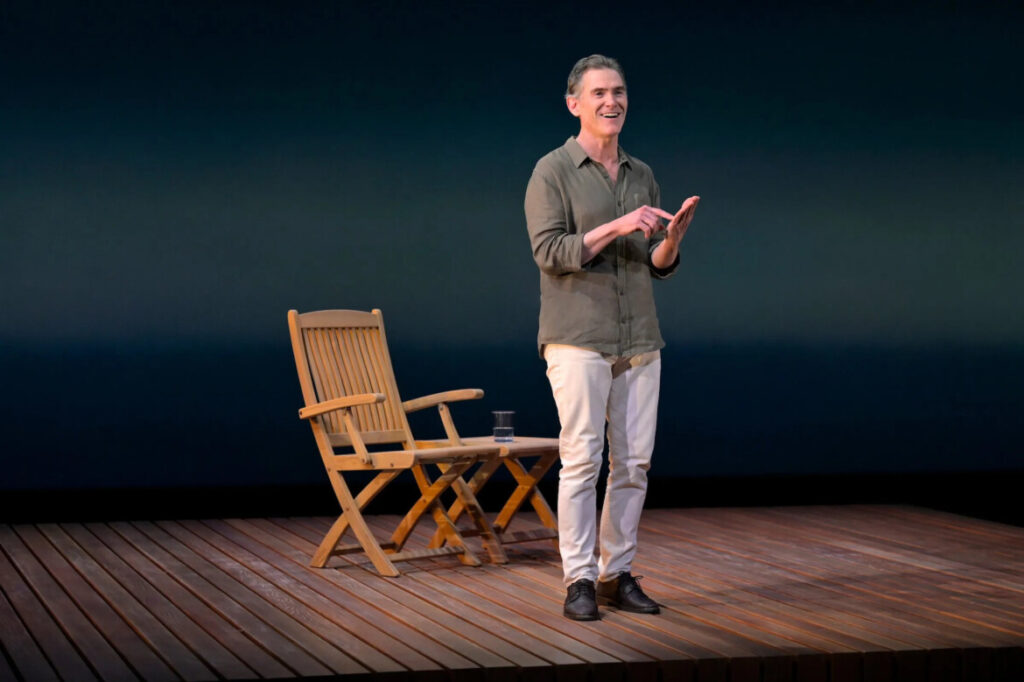
“Why would anyone read reviews?!” asks the brash title character of David Cale’s funny, brainy one-actor play “Harry Clarke”, now at the Berkeley Rep. “Surprise me!”
You’re safe to continue, dear reader:
As performed by Tony and Emmy winner Billy Crudup, this vividly devilish show is spring-loaded with so many surprises on so many levels that reading reviews could never spoil it.
Neither could reading the script. Or even hearing Crudup and director Leigh Silverman’s recorded version, which is available through Audible (I’d listened twice before seeing the Berkeley production).
Crudup affects different voices—including two completely distinct British accents; one cockney, one posh—for each of the approximately two dozen characters in a this sprightly-told tale of self-consciousness, class-consciousness and the unconscionable actions they provoke.
But he also brings them to life with crisp physical shifts. Crudup confidently leads with his pecs when he’s Harry; abashedly wobbles his head as a crunchy granola songstress; and matches a vocal stutter with trembling hands as Philip Bruggelstein, the bullied gay Indiana school boy from whose damaged psyche the adult Harry emerges.
Crudup’s delicious comic timing extends from his lines through his limbs.
Watching this performance feels a bit like peering through that gizmo optometrists use to adjust a prescription, rotating through different lenses on each eye: Is this one better?—CLICK—Or this?— CLICK—How about this one?
You can always see Crudup, but with every miniscule softening and sharpening he delivers a distinctly different character. This cipher-like transmutability will be familiar to viewers of Apple TV’s “The Morning Show,” in which Crudup’s cryptic network executive changes demeanor on a dime.
Hidden secrets
Here, Crudup’s performance metaphorically echoes and amplifies the instability of Bruggelstein, who moves in and out of his hardy Harry Clarke persona—initially on purpose, but later involuntarily—as a coping mechanism as he flees his middle-class background and inveigles himself into upper crust New York society.
The 1% is represented by the Schmidts, a family of four, each of whom is deftly etched by Crudup—the wine-tipsy septuagenarian matriarch is small masterpiece of characterization—and three of whom are sexually toyed with by Harry.
After several narrative twists and turns, playwright Cale doesn’t quite stick the landing: Our solipsistic main character is, appropriately enough, alone on an exotic island. He’s superficially happy but fundamentally a fraud. In short order, we know his triumph will slip from idyllic to Pyrrhic. “Harry Clarke” ends as unsettled as it begins.
Still, if Cales’ script doesn’t wrap things up with a Christmas bow it compensates with a treasure trove of easter eggs. “Harry Clarke” is loaded with enough sly references and winking meta-commentary to provide surprises through multiple viewings.
There’s a series of film noir jokes and homages; an inclusion of singer Sade in the plot that not only accentuates the silky flow of Harry’s cons but rewards a close reading of the lyrics of “Smooth Operator” and “Hang On to Your Love”; and the crucial scene quoted above, which takes place in a theater and invites audiences to cogitate on not only the function and purpose of reviewing, but that of acting, of lying, of playing oneself in the world.
